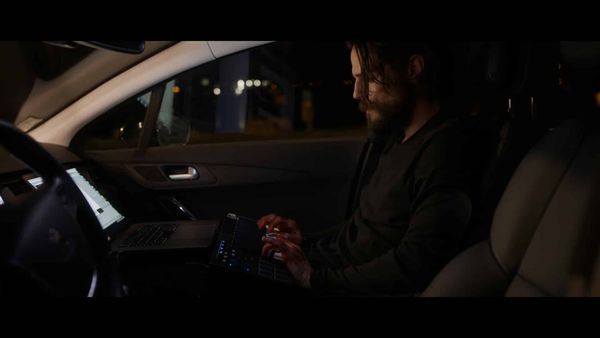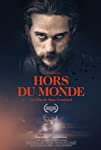Eye For Film >> Movies >> Out Of The World (2021) Film Review
Out Of The World
Reviewed by: Jennie Kermode

Marc Fouchard's bleakly compelling tale of obsession and violence has the distinction of being the finest piece of filmmaking in 2021's Glasgow Film Festival Frightfest selection and a film that you are unlikely ever to want to watch again as long as you live. It's an elegant example of cinematic portraiture but the picture it paints is of a man you really won't want to know.
If it's painful to watch Léo (Kévin Mischel), it's also painful to be him. He's so ill at ease in the world that he has retreated from it emotionally to a place where he can barely communicate with others, the chat he offers in his work as a taxi driver purely performative and shallow. The only time he seems to feel any satisfaction is when he is composing music (ethereal work created by Pascal Boudet and Cyesm), but his inspiration comes at a high price as he seeks out random women and stabs them to death. There's a compulsiveness to this action rarely portrayed this clearly on film before, but very much in accord with studies of such killers. Léo doesn't appear to derive sexual pleasure from the attacks. Instead, they brings him a sort of peace.

Where does this rage come from? It doesn't manifest in the day to day shows of misogyny or aggression typical of such men as cinema understands them. We even get a scene in which he is shown to be on good terms with his mother. Only once does his veneer crack, when he sees an adult man threaten a child. The blast of emotion that Mischel makes visible in a split second is devastating and hints at some still more awful origin for this madness. It's the only time that Fouchard directly invites us to empathise with the monster he has created. The rest of the time we can only watch in horror, outside his world as he is outside everybody else's.
Amélie (Aurélia Poirier) is a dancer (like Mischel in real life). She's deaf and listens to Léo's music in his taxi by pressing her face against the door. Intrigued by her, he follows her to her studio, and the two subsequently begin a shy courtship. Her different approach to communication seems to break through his loneliness, to reach him without causing distress. We share tender moments with them in a local park. But will he kill her too?
With a stunning central performance which draws viewers in against their will, this is a study of compulsive violence presented not as a source of thrills but as a tragedy. Léo never seems cool, only mentally ill, desperately unhappy but unable to do anything about it. Other people's motives and emotions puzzle him. We are never asked to forgive him, simply invited to understand and to observe the way that he moves through the world not like some apex predator but like a car whose brakes and steering have gone. The deep sense of wrongness throughout is not only moral. Something here is fractured, askew. There is a constant sadness.
Reviewed on: 07 Mar 2021
















